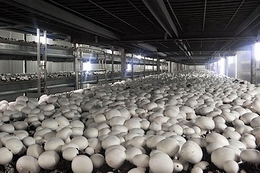 The Treviso Mushroom Consortium Producer Organisation - created by 13 agricultural holdings and companies in the Treviso, Padua and Belluno provice - is the first Italian mushroom production centre, currently handling 30% of the national mushroom production.
The Treviso Mushroom Consortium Producer Organisation - created by 13 agricultural holdings and companies in the Treviso, Padua and Belluno provice - is the first Italian mushroom production centre, currently handling 30% of the national mushroom production.Giorgio Grespan, vice-president of the Cooperative, talks about the current commercial trend and on the main news regarding product innovations.
"With respect to last year, supply has decreased as, because of the substrate, production of field, oyster and poplar mushrooms was lower than that of fellow members. We therefore sold everything, also thanks to sales diversification," explains Giorgio Grespan.
"Our first commercial channel is represented by national fruit and vegetable markets, which absorb 60-65% of our sales. The rest is destined to the most important mass retailers and food industries."
"Demand was rather constant, in line with previous years. Obviously, consumption hasn't decreased as much as in other sectors nonetheless, sales in supermarkets are stronger during promotion periods, whereas there's more stability in wholesale markets."
"There are some problems concerning revenues and payments, but it is to be expected at such difficult times. Thankfully, article 62 of the Liberalisation Decree is helping, in fact our clients are respecting the deadlines required by law."
"Prices remain rather stable, in contrast with increasing production costs. In our case, on top of packaging and transportation, there are also labour, electricity and fuel costs to take into consideration. We have managed to obtain an electricity contract with reduced prices for our members, but unfortunately we couldn't do the same for fuel and labour. As a result, profits for producers diminish once more."
"As regards competition, the Italian industries buy cheaper fresh mushrooms from Poland and Hungary, whereas the frozen and tinned product comes from Holland. Together with Romeo Fuser, chairman of the National Mushroom Grower Association, we have thought that, if the prices of Italian growers were more competitive, their production could double and satisfy the needs of the national market."
Origin is another problem highlighted by Giorgio Grespan. Whereas the short shelf-life (2-3 days) of the fresh produce provides the indication of a national product, it is not compulsory to indicate the origin of frozen or pre-cooked mushrooms, therefore damaging the internal product.





